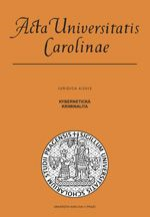Politické otázky před mezinárodními soudy
Political Questions Brought to International Courts
Author(s): Pavel Ondřejek, Jana OndřejkováSubject(s): Law, Constitution, Jurisprudence
Published by: Univerzita Karlova v Praze, Nakladatelství Karolinum
Keywords: international courts; political questions; judicial doctrines
Summary/Abstract: Contemporary decisions of international courts have much stronger effects on the realisation of the states’ policies than they used to have a couple of decades ago. However, the international courts’ approaches to these issues partly differ from those of the national courts. The main reason, from our point of view, lies in the dissimilarities between the international and national law and in the pluralistic relationship between these legal systems. In the opening part we outline several arguments for the application of the prudential doctrines and divide them into general grounds (not specific to international judiciary) and to those related specifically to the establishment of prudential doctrines of international courts. We focus on the following doctrines: the doctrine of non-liquet, the doctrine of margin of appreciation and the consensus doctrine, since we consider the examples of their application by international courts sufficient for a number of conclusions. Nevertheless, the list of the prudential doctrines of international courts remains open. Further research could examine e.g. the way the international courts apply the prudential doctrines originating in national legal orders (such as the proportionality principle or balancing). Another type of problems covers a combination of various judicial doctrines that can lead to the synergic effect of more deference (e.g. the combination of doctrines of non-liquet and margin of appreciation). Presented hypotheses and conclusions can be used in future detailed research on dealing with the political questions by the international courts.
Journal: Acta Universitatis Carolinae Iuridica
- Issue Year: 60/2014
- Issue No: 1
- Page Range: 99-110
- Page Count: 12
- Language: Czech

